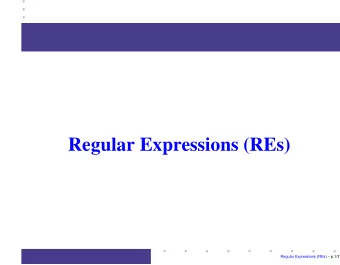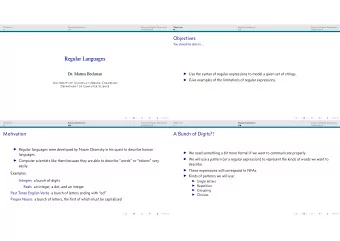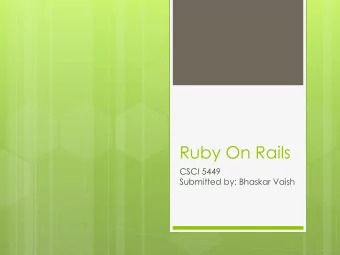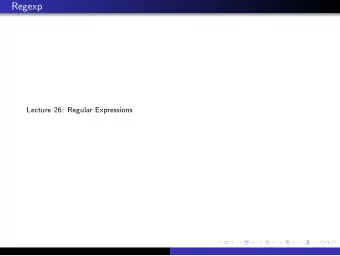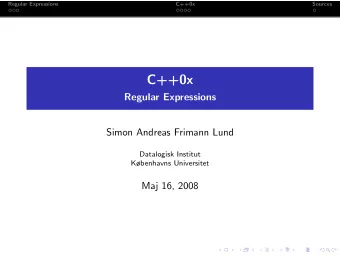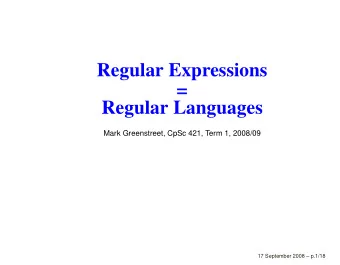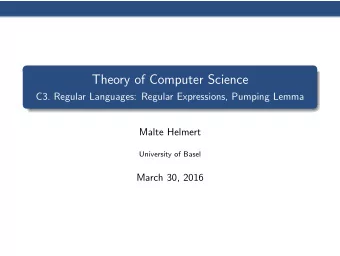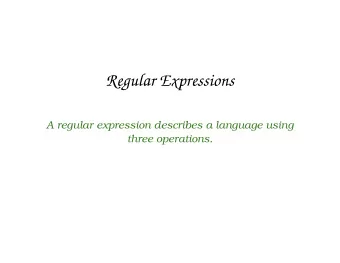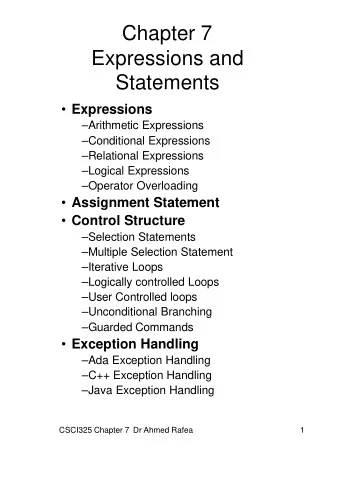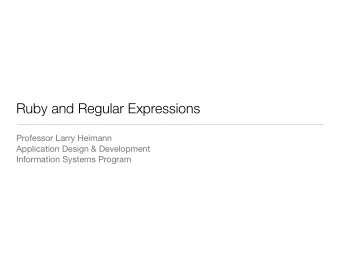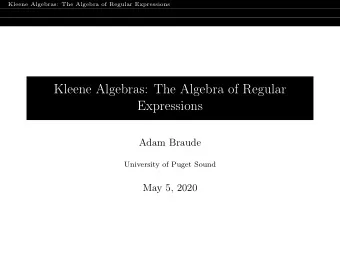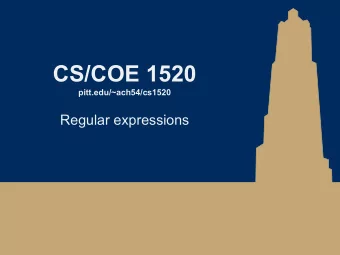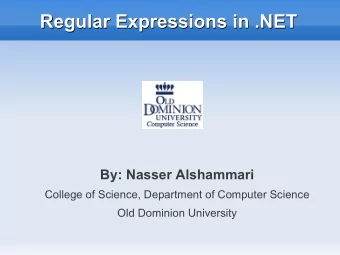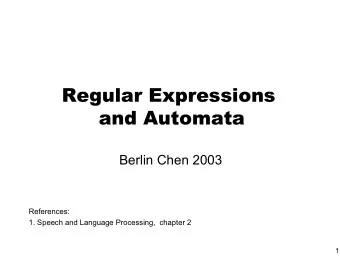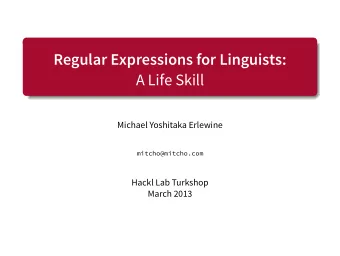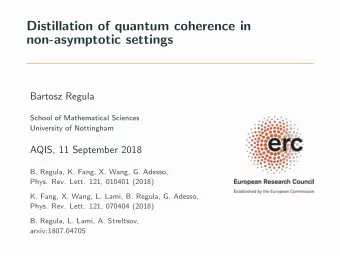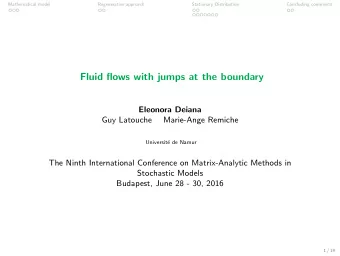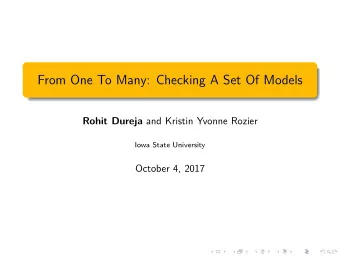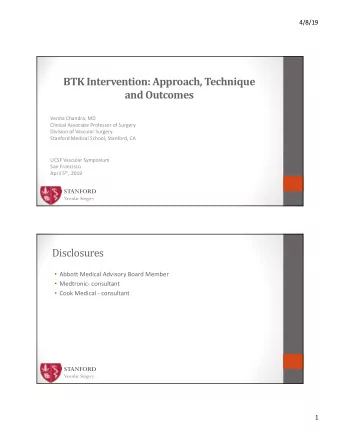
Ruby Regular Expressions AND FINITE AUTOMATA Why Learn Regular - PowerPoint PPT Presentation
Ruby Regular Expressions AND FINITE AUTOMATA Why Learn Regular Expressions? RegEx are part of many programmers tools vi, grep, PHP, Perl They provide powerful search (via pattern matching) capabilities Simple regex are easy,
Ruby Regular Expressions AND FINITE AUTOMATA…
Why Learn Regular Expressions? ● RegEx are part of many programmer’s tools ○ vi, grep, PHP, Perl ● They provide powerful search (via pattern matching) capabilities ● Simple regex are easy, but more advanced patterns can be created as needed (use with care, may not be efficient) ● ruby syntax closely follows Perl 5 Handy resource: rubular.com From: http://www.websiterepairguy.com/articles/re/12_re.html
Outline ● Regular expression basics ○ how to create a pattern ○ how to match using =~ ● Finite state automata ● Working with match data ● Working with named capture ● Regular expression objects ● Regexp.new/Regex.compile/Regex.union
Regular Expressions THE BASICS
Regular Expression patterns ● Constructed as ○ /pattern/ ○ /pattern/options ○ %r{pattern} ○ %r{pattern}options ● Options provide additional info about how pattern match should be done, for example: ○ i – ignore case ○ m – multiline, newline is an ordinary character to match ○ u,e,s,n – specifies encoding, such as UTF-8 (u) From: http://www.ruby-doc.org/docs/ProgrammingRuby/html/language.html#UJ
Pattern Matching ● =~ is pattern match operator ● string =~ pattern OR ● pattern =~ string ● Returns the index of the first match ● Returns nil if no matches ○ Note that nil doesn’t show when printing, but you can test for it
Literal characters ● /ruby/ ● /ruby/i
Character classes ● /[0-9]/ match digit ● /[^0-9]/ match any non-digit ● /[aeiou]/ match vowel ● /[Rr]uby/ match Ruby or ruby
Anchors – location of exp ● /^Ruby/ # Ruby at start of line ● /Ruby$/ # Ruby at end of line ● /\ARuby/ # Ruby at start of line ● /Ruby\Z/ # Ruby at end of line ● /\bRuby\b/ # Matches Ruby at word boundary ● Using \A and \Z are preferred in Ruby (vs $ and ^) http://stackoverflow.com/questions/577653/difference-between-a-z-and-in-ruby-regular-expressions
Alternatives ● /cow|pig|sheep/ # match cow or pig or sheep
Special character classes ● /./ #match any character except newline ● /./m # match any character, multiline ● /\d/ # matches digit, equivalent to [0-9] ● /\D/ #match non-digit, equivalent to [^0-9] ● /\s/ #match whitespace /[ \r\t\n\f]/ \f is form feed ● /\S/ # non-whitespace ● /\w/ # match single word chars /[A-Za-z0-9_]/ ● /\W/ # non-word characters ● NOTE: must escape any special characters used to create patterns, such as . \ + etc.
Repetition ● + matches one or more occurrences of preceding expression ○ e.g., /[0-9]+/ matches “1” “11” or “1234” but not empty string ● ? matches zero or one occurrence of preceding expression ○ e.g., /-?[0-9]+/ matches signed number with optional leading minus sign ● * matches zero or more copies of preceding expression ○ e.g., /yes[!]*/ matches “yes” “yes!” “yes!!” etc.
More Repetition ● /\d{3}/ # matches 3 digits ● /\d{3,}/ # matches 3 or more digits ● /\d{3,5}/ # matches 3, 4 or 5 digits
Non-greedy Repetition ● Assume s = <ruby>perl> ● /<.*>/ # greedy repetition, matches <ruby>perl> ● /<.*?>/ # non-greedy, matches <ruby> ● Where might you want to use non-greedy repetition? Extra info, good to know but not on exams etc.
Grouping () can be used to create groups ● /\D\d+/ # matches non-digit followed by digits, e.g., a1111 ● /(\D\d)+/ # matches a1b2a3… ● ([Rr]uby(,\s)?)+ ● Would this recognize (play with this in rubular) ○ “Ruby” ○ “Ruby, ruby” ○ “Ruby and ruby” ○ “RUBY”
Finite State Automata A BRIEF INTRO
Finite Automata – formal definition Formally a finite automata is a five-tuple(S, Σ , δ , s 0 , S F ) where • S is the set of states, including error state S e . S must be finite. • Σ is the alphabet or character set used by recognizer. Typically union of edge labels (transitions between states). • δ (s,c) is a function that encodes transitions (i.e., character c in Σ changes to state s in S. ) • s 0 is the designated start state • S F is the set of final states, drawn with double circle in transition diagram Theory of Computation view – we won’t be too formal in csci400
Simple Example Finite automata to recognize fee and fie: e S S e 2 3 f e i S S S S 0 1 4 5 S = {s 0 , s 1 , s 2 , s 3 , s 4 , s 5 , s e } ● Σ = {f, e, i} ● δ (s,c) set of transitions shown above ● s 0 = s 0 ● S F = { s 3 , s 5 } ● Set of words accepted by a finite automata F forms a language L(F). Can also be described by regular expressions. What type of program might need to recognize fee/fie/etc.?
Finite Automata & Regular Expressions ● /fee|fie/ ● /f[ei]e/ ● Note: events/transitions are on the lines. Putting them in the nodes/circles is the #1 mistake. ● Note 2: end states should be in double lines, see next slide e S S e 2 3 f e i S S S S 0 1 4 5
Another Example: Pascal Identifier ● Pascal id is a letter followed optionally by letters and digits ● /[A-Za-z][A-Za-z0-9]*/ A-Za-z0-9 S A-Za-z S 1 0
Quick Exercise Go to rubular.com and review RegEx quick reference (same material as prior slides, but more concise) Look up the rules and create both FSA and RE to recognize: ● C identifier ● Perl identifier ● Ruby method identifier Turn in for class participation
RegExp to FSA ● ? = 0 or 1 A-Z x S S S ● [A-Z]?x 0 2 1 ε A-Z ● + = 1 or more ● [A-Z]+ S A-Z S 1 0 ● () = group a-z 1-2 S S S ● ([a-z][1-2])+ 0 2 1
Reg Exp to FSA ● * = 0 or more A-Z 0-9 S S S ● [A-Z]+[0-9]* 0 2 1 0-9 A-Z
RegExp in Ruby SOME HANDY FEATURES
MatchData ● After a successful match, a MatchData object is created. ● Accessed as $~. ● Example: ○ "I love petting cats and dogs" =~ /cats/ ○ puts "full string: #{$~.string}" ○ puts "match: #{$~.to_s}" ○ puts "pre: #{$~.pre_match}" ○ puts "post: #{$~.post_match}"
Named Captures str = "Ruby 1.9" if /(?<lang>\w+) (?<ver>\d+\.(\d+)+)/ =~ str puts lang puts ver end ● Read more: ● http://blog.bignerdranch.com/1575-refactoring-regular-expressions -with-ruby-1-9-named-captures/ ● http://www.ruby-doc.org/core-1.9.3/Regexp.html (look for Capturing)
Regexp class ● Can create regular expressions using Regexp.new or Regexp.compile (synonymous) ruby_pattern = Regexp.new("ruby", Regexp::IGNORECASE) puts ruby_pattern.match("I love Ruby!") => Ruby puts ruby_pattern =~ "I love Ruby!“ => 7
Regexp Union ● Creates patterns that match any word in a list lang_pattern = Regexp.union("Ruby", "Perl", /Java(Script)?/) puts lang_pattern.match("I know JavaScript") => JavaScript ● Automatically escapes as needed pattern = Regexp.union("()","[]","{}")
Resources
Some Resources ● http://www.bluebox.net/about/blog/2013/02/using-regula r-expressions-in-ruby-part-1-of-3/ ● http://www.ruby-doc.org/core-2.0.0/Regexp.html ● http://rubular.com/ ● http://coding.smashingmagazine.com/2009/06/01/essenti al-guide-to-regular-expressions-tools-tutorials-and-resourc es/ ● http://www.ralfebert.de/archive/ruby/regex_cheat_sheet/ ● http://stackoverflow.com/questions/577653/difference-bet ween-a-z-and-in-ruby-regular-expressions (thanks, Austin and Santi)
Topic Exploration ● http://www.codinghorror.com/blog/2005/02/regex-use-vs-regex-abuse.html ● http://programmers.stackexchange.com/questions/113237/when-you-should- not-use-regular-expressions ● http://coding.smashingmagazine.com/2009/05/06/introduction-to-advanced- regular-expressions/ ● http://stackoverflow.com/questions/5413165/ruby-generating-new-regexps-fr om-strings A little more motivation to use… ● http://blog.stevenlevithan.com/archives/10-reasons-to-learn-and-use-regular- expressions ● http://www.websiterepairguy.com/articles/re/12_re.html No longer required – so explore on your own.
Recommend
More recommend
Explore More Topics
Stay informed with curated content and fresh updates.
